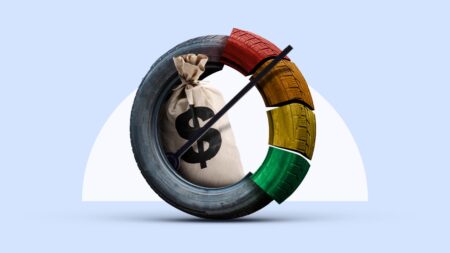Key takeaways
- The CFPB outlined steps taken against lenders that participated in illegal practices that can result in vehicle repossession and damage to borrowers’ credit scores.
- These circumstances were especially prevalent within subprime lenders.
- Look for red flags that could hint at shady business practices, and if you have any complaints, contact the CFPB.
The Consumer Financial Protection Bureau (CFPB) is cracking down on the illegal practices in the auto lending industry it detailed in a recent publication of its Supervisory Highlights. The report broke down common unlawful practices, such as lenders providing inaccurate loan details or unfairly pushing borrowers to purchase add-ons. Such practices may be more common among subprime lenders.
Luckily, by paying careful attention to the fine print and monitoring your payments, you can avoid many of these shady practices — or at least spot and address them early.
How to avoid common illegal practices
Previously, the CFPB has taken companies like Wells Fargo and Toyota Motor Credit to task for illegal practices like withholding refunds and wrongful fees. Now, the CFPB is taking a closer look at auto finance companies — and especially subprime lenders — to ensure borrowers are not being exploited.
This is especially important because vehicle purchases are so costly. “Borrowing to buy a vehicle is one of the largest sources of household debt for American families, and many deal with unnecessary costs and challenges paying for their car,” Rohit Chopra, CFPB director, stated in a CFPB release.
Chopra explained that the CFPB has a duty to take action against lenders that overcharge and repossess even after borrowers have made payments. While the CFPB’s work helps mitigate risks and address wrongdoing by specific lenders, it is important for borrowers to look out for common illegal lender practices.
Sneaky add-on products
An add-on product is an extra feature that you can finance with your auto loan. These tend to be options such as gap insurance, tire and wheel protection, or other extended warranties. They frequently offer low value compared to their cost. Because they are “added on” to your balance, you pay interest on them, resulting in a higher monthly and overall cost.
The CFPB found that certain subprime lenders charged borrowers for add-ons that they did not agree to. In addition, lenders continued to charge borrowers even after the loan was terminated. More troubling, servicers required borrowers to come in person two separate times to the dealership to cancel these products. The CFPB ordered the auto-finance companies to stop these practices and make clear to consumers that add-ons are optional.
How to avoid
Be wary of dealer add-ons. Read your fine print to make sure it doesn’t include any add-ons you did not agree to, and don’t let a lender convince you you are required to purchase add-ons to receive funding. These products can overextend your monthly budget and leave you stuck paying interest on products you likely don’t need.
Wrongful vehicle repossession
Borrowers who fail to keep up with monthly payments or follow requirements outlined in the auto loan agreement may face legitimate vehicle repossession. However, the CFPB found some servicers taking advantage of this process and wrongfully repossessing borrowers’ vehicles.
Even after borrowers made necessary payments, secured loan deferment or modification — all moves that prevent or delay repossession — servicers still took their vehicles. The report also found that vehicles were taken even when the lender lacked a valid and documented lien.
The CFPB requires servicers to properly document liens before repossession.
How to avoid
If you believe your vehicle has been repossessed illegally, contact your lender immediately and be prepared to provide documentation proving you made payments as required. If the problem persists, contact a lawyer.
Misallocated loan payments
When a borrower makes an auto loan payment, the payment should be applied to the loan’s interest and principal as laid out in the loan agreement. The CFPB found that some servicers apply loan payments improperly, resulting in borrowers owing unfair fees.
One example was payments being applied to existing late fees rather than the loan principal and interest. This resulted in borrowers stuck with late fees on their next owed payment as well, even if they paid on time. The CFPB ordered these servicers to fully refund impacted accounts.
How to avoid
If you are unsure whether your auto loan payments went through correctly, contact your lender after you make them. Check your balance and make sure it decreased by the amount you expected, especially if you intended to make a principal-only payment.
Inaccurate rate disclosures
When comparing auto loan rates, borrowers should be able to trust a lender’s word that they could qualify for an advertised rate. CFPB examiners found that this is not always the case. Sometimes, lenders mislead borrowers about what rates they could qualify for.
For example, borrowers would be told they could qualify for rates “as low as” a certain percentage when in practice, the lender’s lowest offered rates were at least double the advertised one. The CFPB has ordered lenders using these tactics to stop using misleading marketing and “bait and switch” marketing tactics.
How to avoid
Prequalify for and compare several offers before signing off on one, and do your homework to determine whether the rate you are receiving is average based on your credit score.
False credit reporting
Making timely payments on an auto loan should help most borrowers build a better credit score and history, but the final practice the CFPB outlined puts borrowers’ credit scores at risk. Lenders put inaccurate loan information on borrower credit reports, potentially impacting thousands of consumers. Servicers would outline incorrect loan payment dates or false loan payoff amounts.
The CFPB also noted instances of lenders using unreliable computer systems that were unable to log auto loan information accurately. Lenders are now reviewing and updating the information for impacted borrowers.
How to avoid
Check your credit report frequently to make sure there are incorrect items, like reports of missed payments when you know you have paid on time. You can check your credit report with all three major credit bureaus for free up to once a week at AnnualCreditReport.com.
Read the full article here
















